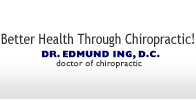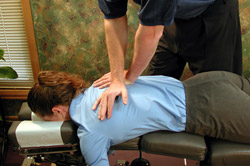



|

|

|
|
|
Symptoms and the Chiropractic Lifestyle Would you rather be healthy or just feel good? It surprises many patients when they discover chiropractic doctors don’t treat symptoms. A traditional medical approach works on symptoms by using drugs or surgery to numb, slow down, speed up, or cut out the malfunctioning body part. Instead, chiropractic doctors find the underlying cause(s) of your ache or pain, and correct it. This improves symptoms naturally. Judging your health by how you feel can be dangerous! The first symptom of high blood pressure is often a deadly stroke. The first symptom of heart disease could be a fatal heart attack! Because your body is so adaptive, by the time many symptoms warn you of a problem, it can be well advanced. You can be healthy and still not feel well. Vomiting after eating improperly prepared food is a healthy response. Taking a drug to prevent your body from expelling the toxic food could be deadly! Fevers, diarrhea, and other symptoms are natural ways your body responds to infection and disease.  Proper function, controlled by your nervous system, is the key to
health. Fortunately, the proper function of your nervous system is the
primary interest of your chiropractic doctor.
Proper function, controlled by your nervous system, is the key to
health. Fortunately, the proper function of your nervous system is the
primary interest of your chiropractic doctor.Symptoms are a warning sign. Headaches are not normal. Backaches are not normal. Numbness and tingling are not normal. These and countless other symptoms that prompt people to consult a chiropractic office are often the result of years of neglect. Chiropractic doctors find the underlying cause(s) of your ache or pain, and help correct it. When spinal function improves, your symptoms usually improve too.
THE CHIROPRACTIC LIFESTYLE
Chiropractors are experts in the care of the bones, nerves, muscles and connective tissues that make up about 60% of your body. All of the joints in your body are part of this musculo-skeletal system and its optimal function is necessary for overall good health. Ask your Doctor of Chiropractic for more information about a care program that may include specific spinal adjustments, exercise recommendations, nutritional advice or other conservative methods of care based on your health history, age, current condition and lifestyle. REFERENCES:
Barge, F. H., D.C., Tortipelvis, The Slipped Disc Syndrome; Its Cause and Correction, 4th edition, Bawden Brothers Printing, Inc., 1986. Collins, D., M.D., Dynamic Differential Diagnosis, The Lippincott Company, 1981. Govan, A., Callander, R., MacFarland, P., Pathology Illustrated, 2nd edition, Churchill Livingstone, 1986. Marmot, M., Elliott, P., Coronary Heart Disease Epidemiology, 3rd edition, Oxford Medical Publications, 1992. Maynard, J., D.C., Healing Hands, 4th edition, Jonorm Publishing Company, 1991. Mendelsohn, R., M.D., How to Raise a Healthy Child, Contemporary Books, 1984. ©2002 Back Talk Systems, Inc.
(800) 937-3113 (303) 277-9990 www.backtalksystems.com |
||||||||||||||||||||||||||||||||||||||||||||||||||||||||||||||
|
|
|||||||||||||||||||||||||||||||||||||||||||||||||||||||||||||||